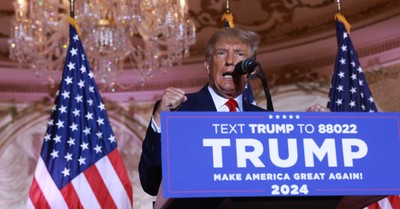Marriage and the Virtue of Loyalty
- Al Mohler President, The Southern Baptist Theological Seminary
- Updated Jun 09, 2008

Can we live without loyalty? James Q. Wilson argues that the decline of marriage and loyalty now threatens to undermine our social cohesiveness and to produce a generation that cares little about loyalty and prizes freedom over character.
James Q. Wilson is one of America's foremost public intellectuals. His writings launched a revolution in our understanding of crime and social dysfunction and his insights into our cultural crisis provide some of the most insightful analysis and constructive arguments yet to be found. Now serving as the Ronald Reagan Professor of Public Policy at Pepperdine University, Wilson sees the decline of marriage as a central threat to civilization itself.
In "The Ties That Do Not Bind: The Decline of Marriage and Loyalty," published in the Fall issue of In Character, Wilson addresses the decline of marriage within its larger social context--arguing that our current marriage crisis is rooted in a basic failure to reconcile the values of character and freedom.
"Of all of the relationships into which people enter, the family is the most important," Wilson asserts. "We are raised by parents, confronted with siblings, and introduced to peers through our familial roots. Indeed, human character arises out of the very commitments people make to others in their family or outside of it. Marriage, of course, is the supreme form of that commitment."
Thus, when marriage is marginalized, character suffers. Wilson knows the statistics. Married couples are happier, in the main, than unmarried persons, and married couples and their children are less likely to commit crimes. Of course, the virtues of marriage far exceed those statistical indicators. Nevertheless, the social fallout caused by the marginalization of marriage is easy to document.
Wilson understands that our current cultural crisis is deeply rooted in a larger intellectual context. He sees the essential tension that produces America's culture war as a battle between character and freedom. "The Western world is the proud beneficiary of the Enlightenment, that cultural and intellectual movement that espoused freedom, endorsed scientific inquiry, and facilitated trade," he explains. "But for a good life, mere freedom is not sufficient. It must work with and support commitment, for out of commitment arises the human character that will guide the footsteps of people navigating the tantalizing opportunities that freedom offers." As Wilson sees it, freedom and character "are not incompatible, but keeping them in balance is a profound challenge for any culture."
Wilson brings the issue of loyalty to the forefront of his argument on behalf of marriage. The language of loyalty is central to any consideration of the morality of social life, but Wilson offers unique insights into how the virtue of loyalty is foundational to the very idea of marriage.
Is loyalty always a virtue? Wilson acknowledges that loyalty cannot be the supreme moral good, for it is possible to be loyal to the wrong cause, the wrong authority, or the wrong association. As he remarks, "A Nazi is not regarded as a moral person because he is loyal to Nazism."
Thus, Wilson proposes that loyalty as a positive virtue should be defined as "the natural sociability of people." Accordingly, "A loyal person is someone who is attached to other people for the long term based on a deep sense of what is due to them."
In some, Wilson argues that a sense of loyalty is a civilizational essential and that the context of the family--with marriage at the center--is essential to the inculcation of loyalty in the young. Sociopaths are produced when this essential commitment to loyalty is missing. The risk of producing sociopaths escalates significantly when a large number of children and adolescents lack the loyalty-building context of the family with married parents.
"The fundamental social institution that encourages loyalty is the family," Wilson argues. "An infant is raised by one or two parents and acquires an attachment, usually a strong one, to these people." Beyond this, the child develops attachments of loyalty to siblings, extended family, and peers as brought into the individual's life through the structure of the family and its life.
Looking to Western Europe and its ongoing experiment with radicalized social revolution, Wilson suggests that the more radical heirs of the Enlightenment are trying to reap the benefits of marriage while simultaneously undermining the institution. He correctly points to the fact that a growing number of activists and ideologues in the United States are urging this country to follow the same example.
This process is being aided and abetted by the United States Supreme Court. As Wilson recounts: "In the late nineteenth century it spoke of marriage as a 'sacred obligation' and a 'holy estate' that was the source of civilization itself. By 1972 it had abandoned any such reference and said instead that marriage is 'an association of two individuals, each with a separate emotional and intellectual makeup.' Marriage was once a sacrament, then it became a sacred obligation, and now it is a private contract."
The embrace of cohabitation as an alternative to marriage has accelerated the decline of marital commitment. "Men and women who cohabit have only a weak incentive to pool their resources and to put up with the inevitable emotional bumps that come from sharing an apartment and a bed," Wilson explains. Couples choose to cohabitate rather than to marry precisely because they do not want to be bound by the public commitment that marriage represents. Furthermore, the stigma and shame associated with unmarried cohabitation--and with having children out of wedlock--has largely evaporated.
"Why does marriage beget loyalty when cohabitation does not?," Wilson asks. "The difference is that marriage follows a public, legally recognized ceremony in which each person swears before friends and witnesses to love, honor, and cherish the other until death parts them. Cohabitation merely means shacking up."
Interestingly, Wilson traces a growing cultural recognition that the decline of marriage is detrimental to the society. Nevertheless, the majority of Americans appear unwilling to do anything about the problem. Furthermore, the problem becomes more acute among the young. Wilson notes that sixty percent of high school seniors think that cohabitating before marriage is likely to lead to greater happiness if the couple should ever choose to marry. The exact opposite is the case, of course. A mountain of statistical evidence and research indicates that cohabitation prior to marriage actually weakens any future marriage. Wilson cites sociologist Barbara Dafoe Whitehead's argument that "cohabitation is not to marriage what spring training is to baseball."
Wilson sees some signs of hope on the horizon. As he presents his case, he admits that there is "no magic bullet" that will quickly lead to a recovery of marriage and its central loyalties in the near future. Our society has actually created financial and legal incentives to avoid marriage, to give birth to children out of wedlock, and to dissolve marriages at will. In the end, however, James Q. Wilson argues that a recovery of marriage and the virtue of loyalty that marriage and family uniquely inculcate will be essential to the future of our civilization. Once again, the issue comes back to the tension between character and freedom. "In every aspect of our lives we accept limits to freedom," Wilson explains, "but in the case of the limits set by marriage we gain a great deal in return: longer, healthier lives; better sex; and decent children. Loyalty to spouse and children and relatives enhances our capacity to enjoy the freedom we have."
Wilson's analysis affirms the essential goodness of marriage and its central place in civilization. This important article represents both a warning and a sign of hope.
This article originally appeared on October 19, 2005.
R. Albert Mohler, Jr. is president of The Southern Baptist Theological Seminary in Louisville, Kentucky. For more articles and resources by Dr. Mohler, and for information on The Albert Mohler Program, a daily national radio program broadcast on the Salem Radio Network, go to www.albertmohler.com. For information on The Southern Baptist Theological Seminary, go to www.sbts.edu. Send feedback to mail@albertmohler.com.




















